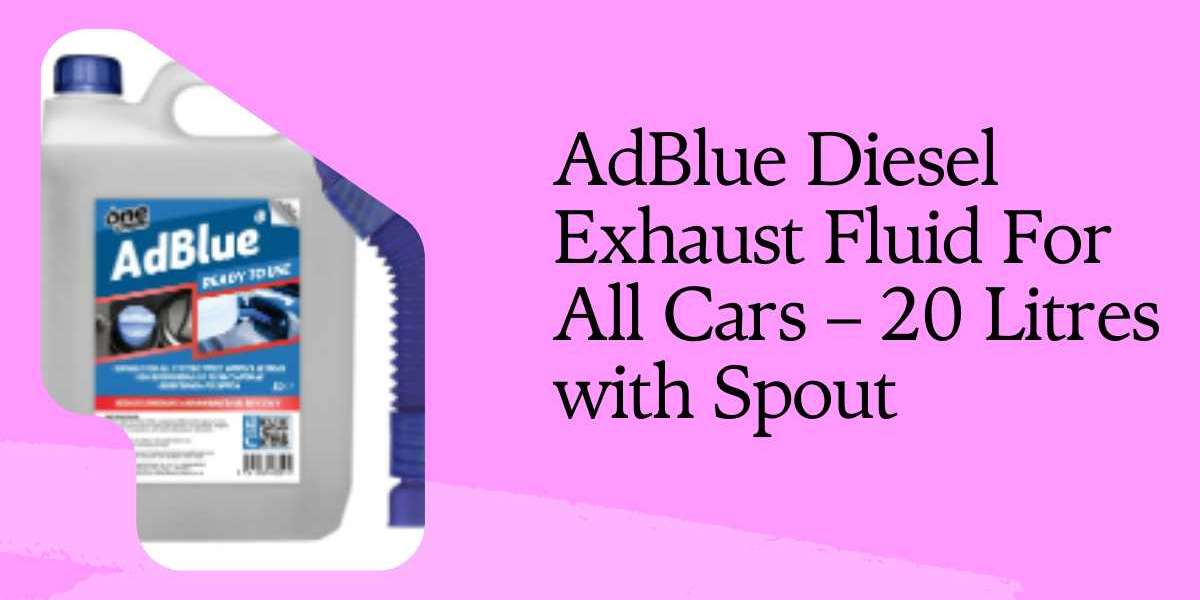With increasing regulations on vehicle emissions, AdBlue has become a crucial component for diesel engines. This high-purity urea solution plays a key role in reducing nitrogen oxide (NOx) emissions, helping vehicles comply with strict environmental standards. Whether you own a truck, bus, or passenger car, understanding how AdBlue works and how to use it correctly is essential.
This guide will cover everything you need to know about AdBlue, including its benefits, proper usage, storage tips, and common issues.
What Is AdBlue?
AdBlue is a non-toxic, colorless liquid made from deionized water and urea (32.5%). It is used in Selective Catalytic Reduction (SCR) systems to convert harmful NOx emissions into harmless nitrogen and water vapor. This process significantly reduces air pollution and ensures compliance with Euro 6 emission standards.
Key Features of AdBlue:
Composition: 32.5% urea and 67.5% deionized water
Usage: Works with SCR-equipped diesel engines
Function: Reduces harmful NOx emissions
Environmental Impact: Helps lower air pollution levels
How Does AdBlue Work in Diesel Vehicles?
AdBlue is injected into the SCR system, where it reacts with NOx gases in the exhaust. This chemical reaction breaks down the pollutants into harmless nitrogen and water vapor.
Step-by-Step Process:
Injection: AdBlue is sprayed into the exhaust stream.
Chemical Reaction: Urea breaks down into ammonia.
NOx Reduction: Ammonia reacts with NOx, converting it into nitrogen and water.
Emission Control: The cleaned exhaust leaves the system with fewer pollutants.
Benefits of Using AdBlue
Using AdBlue offers several advantages for both the environment and vehicle owners.
1. Reduced Emissions
SCR technology helps cut NOx emissions by up to 90%, making diesel engines more eco-friendly.
2. Compliance with Emission Standards
Vehicles using AdBlue meet Euro 6 regulations, ensuring they can operate in low-emission zones without penalties.
3. Improved Fuel Efficiency
By optimizing combustion, AdBlue allows diesel engines to run more efficiently, potentially reducing fuel consumption.
4. Increased Engine Lifespan
Lower emissions mean less carbon buildup, reducing engine wear and improving long-term performance.
5. Cost Savings
Avoiding emission-related fines and improving fuel economy can lead to significant cost savings over time.
Which Vehicles Require AdBlue?
AdBlue is used in a wide range of diesel-powered vehicles, including:
Trucks and Lorries – Most heavy-duty trucks require AdBlue for emission control.
Buses and Coaches – Public transport vehicles use SCR systems to meet legal requirements.
Passenger Cars – Many modern diesel cars, including models from BMW, Audi, and Mercedes, use AdBlue.
Agricultural Machinery – Tractors and harvesters often need AdBlue to comply with emission laws.
Construction Equipment – Bulldozers, excavators, and loaders rely on AdBlue for cleaner operation.
How to Use AdBlue Properly?
1. Check the AdBlue Tank Regularly
Most vehicles have a dedicated AdBlue tank, separate from the fuel tank. Check the level frequently to avoid running out.
2. Refill Before It Runs Out
If the AdBlue level gets too low, your vehicle may enter limp mode, restricting performance. Always refill in advance.
3. Use Only High-Quality AdBlue
Ensure you purchase AdBlue from reputable suppliers to avoid contamination and engine damage.
4. Store AdBlue Correctly
Keep AdBlue in a cool, dry place away from direct sunlight. Exposure to extreme temperatures can degrade its quality.
5. Follow Manufacturer Guidelines
Always refer to your vehicle’s manual for specific AdBlue requirements and recommended refill intervals.
Common Problems with AdBlue and How to Fix Them
1. Crystal Formation in the SCR System
Cause: Exposure to air can cause AdBlue to crystallize.
Solution: Regular maintenance and flushing can prevent buildup.
2. Low AdBlue Warning Light
Cause: The tank is nearly empty.
Solution: Refill as soon as possible to avoid engine restrictions.
3. Contaminated AdBlue
Cause: Using low-quality or improperly stored AdBlue.
Solution: Always use certified AdBlue and store it correctly.
4. Freezing in Cold Weather
Cause: AdBlue freezes at -11°C.
Solution: Many vehicles have heated tanks to prevent freezing.
How Much Does AdBlue Cost?
The cost of AdBlue varies depending on quantity and supplier. On average:
Small Bottles (5L): $10–$20
Bulk Containers (20L): $30–$50
Larger Quantities (200L+): Prices vary, but bulk buying reduces costs.
Fleet operators often negotiate better prices through wholesale suppliers.
Where to Buy AdBlue?
You can buy AdBlue from:
Fuel Stations – Many service stations offer AdBlue refills.
Auto Parts Stores – Available in small and large containers.
Online Retailers – E-commerce platforms provide convenient delivery options.
Dealerships – Car manufacturers often sell recommended AdBlue for their models.
Does AdBlue Expire?
Yes, AdBlue has a shelf life of about 12 to 18 months if stored properly. Avoid direct sunlight and extreme temperatures to maintain its effectiveness.
FAQs About AdBlue
1. What happens if I run out of AdBlue?
Your vehicle may enter limp mode or refuse to start until you refill the tank.
2. Can I mix different brands of AdBlue?
Yes, as long as they meet ISO 22241 standards.
3. Is AdBlue harmful to humans?
No, but it can irritate skin and eyes. Wash off immediately if spilled.
4. Can I use water instead of AdBlue?
No, doing so can damage the SCR system and void warranties.
5. How often should I refill AdBlue?
It depends on your vehicle. Most cars need a refill every 3,000 to 10,000 miles.
Conclusion
Using AdBlue is essential for modern diesel vehicles to meet emission standards and maintain efficiency. Regular refilling, proper storage, and using high-quality AdBlue will keep your vehicle running smoothly while reducing environmental impact. If you drive a diesel-powered car or truck, keeping your AdBlue tank topped up is not just a recommendation—it’s a necessity.











